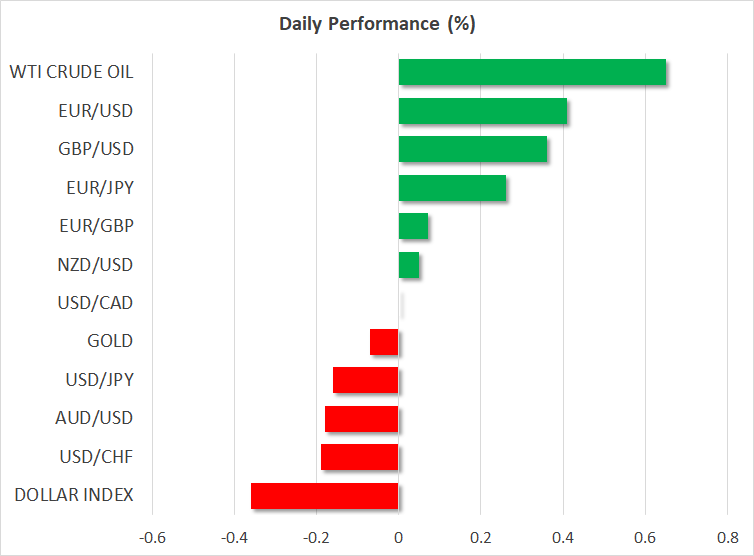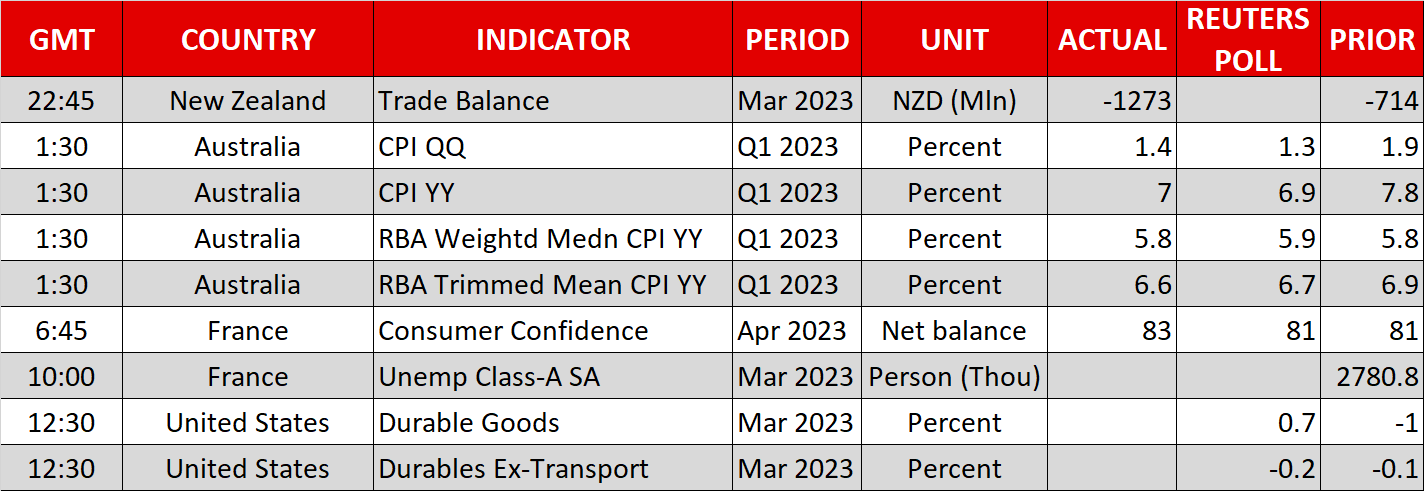Dollar Gains Amid Renewed Recession Fears
2023.04.26 06:06
- Dollar, yen gain as investors seek shelter
- Fed rate cut bets are back firmly on the table
- Euro uptrend may stay the course as ECB seen hiking more
- Wall Street slides amid renewed economic concerns

Dollar wears its safe-haven suit again
The dollar strengthened against the other major currencies on Tuesday, with the only exception being the yen, suggesting that the dollar’s gains may have been the result of safe-haven inflows. Today, the US currency is pulling back.
Indeed, the greenback managed to gain ground without any data or headlines spreading a fresh wave of optimism with regards to the US economy. On the contrary, disappointing earnings results may have revived recession concerns, with First Republic Bank’s shares tumbling to a record low after the bank announced that depositors withdrew more than $100bn.
Combined with warnings by Spain’s Santander (BME:) about a slowdown in the mortgage market, this may have served as a reminder that the adverse effects of the latest banking turmoil have yet to dissipate, adding pressure on equities but also on treasury yields. The disconnect between the US dollar and Treasury yield validates the idea that the dollar is benefiting from a risk-off environment rather than stellar economic data and/or bets for more rate increases by the Fed.
Yes, another quarter-point hike is almost fully priced in for next week’s Fed decision, but investors brought back to the table some additional basis points worth of rate reductions by the end of the year. Specifically, they are now pricing in slightly more than two quarter-point cuts by December, with more to come in 2024.
A hawkish ECB may continue being a tailwind for the euro
On the contrary, the European Central Bank is forecast to deliver three more quarter-point hikes this year and no cuts at all. Investors are also seeing a 30% probability for the Bank to proceed with a double 50bps hike at next week’s meeting.
In any case, there is a profound divergence in monetary policy expectations between the ECB and most of the other major central banks, and that’s keeping the euro in uptrend mode. The only other central banks that are not expected to cut rates this year are the BoE and the SNB.
A further pullback in euro/dollar cannot be ruled out if the greenback continues to attract safe haven flows, but it is hard to envision a full-scale reversal at the moment. The divergence in policy expectations between the Fed and the ECB could keep the bulls in the game, who may attempt a comeback soon and aim for another test at around 1.1070. If they manage to overcome that zone, the uptrend may extend towards the high of May 31 at around 1.1175.
Risk aversion hurts equities
All three of Wall Street’s indices tumbled more than 1% yesterday, with the tech-heavy Nasdaq plunging around 2% and recording its biggest single-day slide since March 9. It seems that the increasing recession concerns may have prompted some investors to abandon risky assets like equities, but looking at the whole canvas, the picture is far from being bearish.
Liquidity and expectations of rate reductions by the Fed have been supportive for indices. Although it fell yesterday, the S&P 500 remains relatively close to the key resistance territory of 4150 and with the futures market pointing to a higher open today due to upbeat results from Microsoft (NASDAQ:) and Alphabet (NASDAQ:), another test near that zone soon cannot be ruled out.
Yes, valuations suggest that many stocks remain overvalued, but the biggest companies on Wall Street are high-growth tech firms that are valued by discounting expected cash flows for the quarters and years ahead. Therefore, with some earnings and future estimates coming in strong, others not as bad as expected, and expectations that the Fed will start cutting interest rates later this year, present values may continue increasing, which may keep investors hooked on for a while longer. Even if stock indices experience deeper slides, a decent performance by high-growth firms may keep the losses limited.









